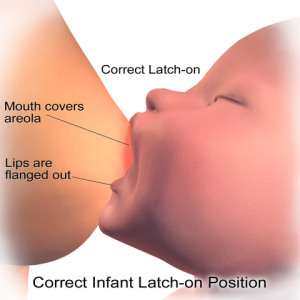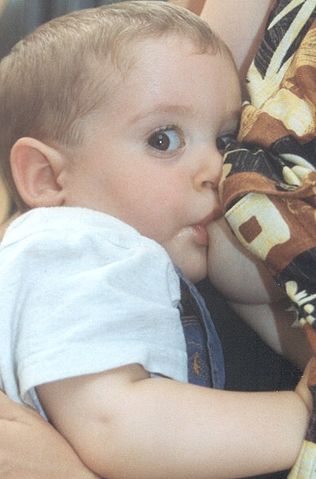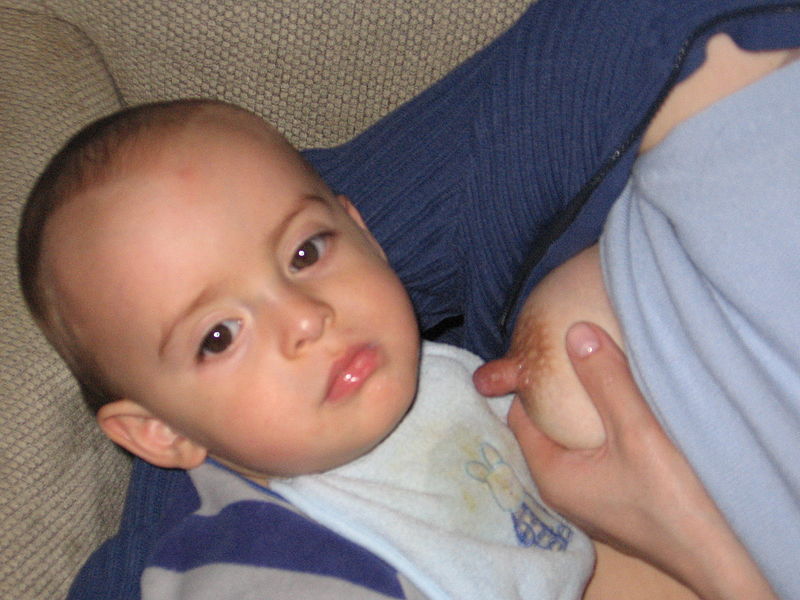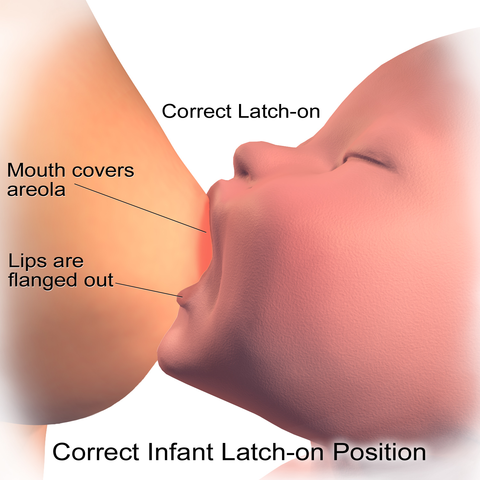 Breastfeeding is such a rewarding experience for both mother and and baby, but it is an important skill that requires time and practice. Read on, most especially if you have a newborn baby.
Breastfeeding is such a rewarding experience for both mother and and baby, but it is an important skill that requires time and practice. Read on, most especially if you have a newborn baby.
I did not go to classes when I was pregnant and although I read up on it, I did not realise how painful it can be at the onset. I thought that when you give birth and the baby is placed on your chest, this would come naturally and you will have milk coming out of you. Boy, was I wrong. It hurt!
Since I was still learning then (and so was my baby), it reached the point that I almost gave up. I was literally squirming in pain! No judgment please, but I actually dreaded feeding time since I knew I could not give much to my baby (at that time).
My nipples were sore, cracked, and bleeding! Lansinoh became my bestfriend! Didn’t know how much I can take, but it was a good thing that my nurses never got tired of helping me and pushing me to breastfeed. You cannot imagine how happy I was when milk was finally flowing!
Why is this important?
Breast milk meets all your baby’s nutritional needs for the first six months, and it will continue to be an important part of their diet for the first year. It contains anti-bodies that protect against infection and illnesses. Babies are less likely to get sick!
It also ensures normal brain development., They say that breastfed babies have higher IQ scores.
Recent studies also show that breastfeeding may help prevent diabetes! It increases insulin sensitivity and improves glucose metabolism in mothers.
Breastfeeding is also important to infant’s eyesight, speech, jaw, and mouth development. It even strengthens your bond with your baby. Nothing beats the cuddles, smiles, and quality time during breastfeeding. And you can get back to your pre-pregnancy bod quicker.
How does it work?
Breasts have lots of milk ducts that carry the milk to the nipple. The milk then flows through tiny openings in the nipple. And in case you wanna know, your capacity to make milk is not necessarily related to your breast size. Its more about your baby’s sucking when you breastfeed. Thank goodness, right?
Young babies need to feed frequently since their tummies are small and breast milk is easily digested. So, the more often your baby sucks milk from your breasts, the more milk will be produced. This is called supply and demand.
You will even notice that there are two types of breast milk. The initial one is thinner and has lower fat content. This is referred to as “foremilk”. This helps to quench your baby’s thirst. Eventually, during the feed, the milk will be thicker. This is known as “hindmilk”. It has higher fat content and this is the more nutrient-filled milk. It will satisfy your baby’s hunger.
At times, your baby will be satisfied with one breast. Sometimes, they will want the other side too. The trick is to offer both.
Why do moms stop breastfeeding?
Okay, we can’t do much if mom has a medical condition. For most, one of the common reasons for stopping breastfeeding is that mothers think they do not have enough milk. Usually, that is not true.
Breastfeeding tip and trick #1: Supply equals demand. Feed often and this will increase the amount of milk you are making. Our bodies are smart that way. And don’t you just love breast milk – its portable, warm, and ready to serve!
Breastfeeding tip and trick #2: Avoid using a dummy or pacifier while you are still establishing your milk supply. We want your baby to get used to you.
 Breastfeeding tip and trick #3: Check if your baby is not attached properly. This happened to me, argh! If your baby is latched properly, it should not hurt.
Breastfeeding tip and trick #3: Check if your baby is not attached properly. This happened to me, argh! If your baby is latched properly, it should not hurt.
You may feel so upset at the beginning, so its important to have someone help you. Sit comfortably and hold your baby skin-to-skin. Use the position that feels right for you. Support your baby as you bring their head near your nipple. Their mouth should be wide-open to cover the nipple and the larger darker area (or areola).
Beware if they are nibbling away at your nipples!
That mean they are not latched well. Then their chin should be pressed against your breast, lips open, and they should be able to breath from their nose. Remember, bring your baby to your breast, not your breast to your baby.
Practice makes perfect!
How often should you feed your baby?
Small babies usually feed every 2-4 hours since breast milk is easily digested. The interval lengthens gradually as they become older.
Breastfeeding tip and trick #4: Don’t wait for your baby to cry before you feed them. Its harder to settle your baby that way. I recommend that you take note and time their feeding schedule.
Look for cues that they are hungry. It may be that they are unsettled, their mouth is open, or they put their hand to their mouth. Another thing I learned from watching Oprah was that babies have a secret language due to their reflexes. When they are hungry, you will hear them say “neh”. Try it! Finally, do not forget to burp your baby after a feed.
If you have other tips and tricks that you’d like to share, please go ahead an leave a comment below. It will be good to hear from someone who knows what its like to care for a baby, especially when you are having one of those days.




Hi Raquel! I have stopped breastfeeding for a year now, but I wish I came across your site earlier. Then maybe, I might still be breastfeeding. I am still trying to look around and educate myself in case baby no.3 comes along. Do you think oatmeal or tea is better at helping increase milk supply? I am asking this because I am quite sure if baby no.3 comes along, I would be 80% dependent on the Medela Symphony to do all the hard work for me.
Hi Zinette! Glad to hear that you also went for breastfeeding. One tip that I can give is to really feed often and pump when you can if you want to manage your milk supply. Supply equals demand. Your body adjusts to the amount of milk your baby needs. Your Medela Symphony might as well be your best friend since this can help you a lot even when you need to pump milk at work.
If you’ve nurse often and your baby is latched well, yet think you still need a boost, you can consider adding milk stimulating food and lactation drinks to your diet. Oatmeal and tea are definitely worth a shot, and you can also try supplementing with moringa. Let me know if you have further questions when you do decide to have another baby. All the best!
You provide some really great tips on breastfeeding, especially for new mothers. I believe the tips and tricks you provided will deter women from discontinuing their breastfeeding regimen.
I am going to share all of this information with my wife tonight to see if she can implement it! Thank you so very much!!
Happy to hear that, Bimmerguy! Hope your wife benefits from these tips! Will be interested to hear how her breastfeeding journey goes. All the best!
Raquel, I know what you mean by almost giving up. I have a 10 month old baby, and one week after she was born, I was crying to myself because I really looked forward to breastfeeding my baby for at least a year and yet after a week I was also dreading feed time. It didn’t help that my mother is not a breastfeeding advocate and both she and my partner were more than ready to buy formula when I was having problems than trying to help and encourage me to breastfeed. I called the hospital to ask for help over the phone, and that also did not work. The only thing that kept me going was my determination, and Google. Google became my best friend and my only ally in my breastfeeding journey. I figured my problem was that she wouldn’t open her mouth wide enough to cover the dark area of my nipples and so I typed that in Google, and found out about the flipple technique. It saved me. After that, it got so much easier. Now, I’m still breastfeeding and me and my baby have obviously bonded. So my tip is: don’t give up. The first 2 weeks of having a baby will be the hardest of the hardest time. Push through, and if you have a problem and nobody around you can help, people like Raquel on the net will.
Wow, you went through a whole ordeal, JeAnn! I admire your persistence and determination BIG TIME! It’s true what they say that if you really want something, you will find a way! I am so glad that you did not give up and learned as much as you can. You even mastered the right way to latch by reading. Way to go! Thanks for sharing this. Hope it also inspires other mommas to keep trying and not give up.
Hi Raquel.
Thanks for sharing these tips. I breastfed both my babies and like you I couldn’t believe how hard it was. I thought either you couldn’t breastfeed or you could. But if you did have breastmilk then it would be a natural thing, boy was I wrong like you!
It hurt and it was uncomfortable, it was tiring and I didn’t understand about growth spurts, supply and demand… I knew nothing. It was so much easier with my second baby, but still hard.
Isn’t it ironic how it can be easier, yet hard at the same time? It’s so hard when you really have no clue what you’re getting into. Like us, I’m sure there are other moms who didn’t know what to do. Here’s to helping other breastfeeding mommas! 🙂 Thanks Lynne!
Wow. I am stunned. Just absolutely amazing. I don’t even know what to say. You are fabulous. Like how did you fit so much info into one post with out cofusing me?
Everything was all on point, very specific and very informative. I can’t believe I have not seen a sight quite like this in the past. And thank you so much for the helpful insight.
Zach Campbell
Market Merchant (MM+)
Thank you for the positive feedback, Zach! Glad you found it helpful. 🙂
This is interesting information ! It is really encouraging to all moms out there looking to do breastfeeding. The amount of milk is not relative to the size of your breasts. It is also very convenient way to feed your baby any time, any place without having to worry about milk bottles, washing and getting hot water.
You nailed it, AL! I just love it that the amount of milk produced is not directly related to your breast size. For sure, a lot of moms will be happy to know that. And yes, it is very convenient. Just be ready with a nursing cover if you’re going out, and a burp cloth. Then you’re good to go.
This is really great information. I breastfed both my children, the first one for a year and the second one for 3 months. A long story!
The second one is sick SOOO much more frequently than the first, and I can’t help but think that breastfeeding has something to do with it. I totally agree how hard it is though. And sometimes its not just the physicality of it, its the mental commitment.
With my first, she wouldn’t take a bottle, which meant I couldn’t be away from her for more than 3 hours or so.. Thats REALLY hard for the first year.
Great, article, I will share it with my friends.
Breastfeeding is really a personal decision. It is also recomended to breastfeed for at least 6 months. While it has so much goodness to offer, it does come with certain challenges. It is indeed frustrating when your bub won’t take the bottle. I can totally relate to not being able to stay away for long. Its really hard! Thank you for sharing this, Ruth. 🙂
This is one of the best blog because you have giving powerful and correct information. newly moms should come across your blog they would really find a powerful and safe information. Today all we lack is legit and safe information that’s the reason people do not trust information. I thank you that you come up with best and correct information.
Thanks for the kind words Adeel! That’s the goal, I definitely want to help as many moms as I can. 🙂